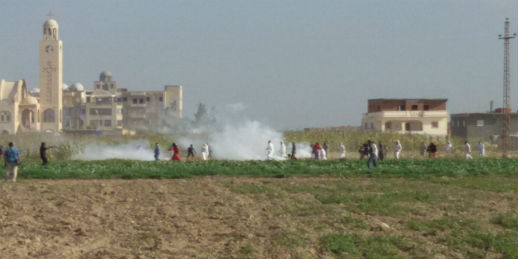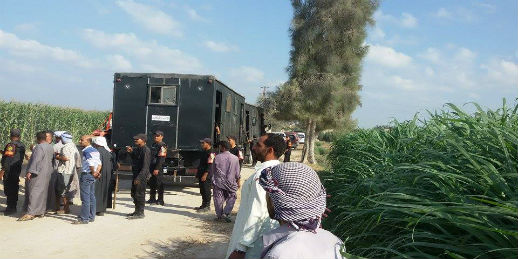
Watani
What in a normal setting is an everyday land dispute can quickly turn into a full-blown sectarian flashpoint with adverse effects on the wider community, when one side of the feud happens to belong to the wrong religion.
This is what Hamdi Makanoti, his family, and local Coptic Christians are facing in a district of Alexandria, Egypt’s second biggest city.
According to veteran Coptic newspaper Watani, two years ago a local Muslim family, al-Houti, unjustifiably claimed land belonging to the Makanotis in Amreyya, a district of about a million inhabitants to the west of the large coastal city. The land, said to have belonged to the Copts for more than 20 years, is reported to be about 10 acres of agricultural land next to the village church of the Holy Virgin and St George.
Although the Coptic family have since successfully asserted their right to their land, including through both common law and more regular legal channels, the Egyptian police were unable to restore the Makanotis to their family property, as large numbers of locals demonstrated around the area, forcing the police to withdraw.
On 20 Sept. police tried once again to allow the Copts to regain their land. Again they met with a large number of demonstrators. A Houti man was shot dead: a forensic report quoted by the Makanotis’ lawyer said the young man was killed by police fire.

Watani
However, the angry crowd immediately blamed the Makanoutis, using the mosque loudspeakers to blame the Christians for killing a Muslim. Large crowds of local armed Bedouins gathered, clashed with the police, and the resistance lasted all day. Watani reports that an hour after the police had been forced to withdraw, more villagers arrived to swell the crowd, which marched on the Makanoutis’ house.
St. George’s church was pelted amid rallying cries of “Allahu Akbar” (God is great) by a whipped-up crowd, reports say. Reports say four Copts’ houses were damaged; two people, Demian Maher (35) and Therese Hanna were injured and are still in hospital, and threats were made of possible mass evictions. . erly
Finally, moderate local tribespeople arrived and intervened, bringing to an end the day’s stand-off. However, local Christians reported being terrified of going out or leaving their homes.
‘We will take your land and homes!’
The Christians say they have received warnings such as: “We will take your land and homes, like it or not. Leave, or we will kill you if you force us to it!”
How serious the threats are for now remains to be seen. One thing is more certain. A forced recourse to “local reconciliation sessions“, as they are known in Egypt, would make the Makanouti family settle for a resolution that relinquishes their rights in exchange for keeping the peace.
More ominous would be a return to events similar to what happened in 2012, when a number of Copts in the same district were impressed upon to leave the locality for fear of their safety. That followed reports of allegedly improper photos taken by a Christian man of a Muslim girl. At the time, a Coptic Church ad-hoc council described this as a “forced repatriation” of Copts.
Through the intervention of a local politician representing the Makanoutis, just such a one-sided agreement was reached on 4 Oct. to impose a four-month truce, which would prohibit members of either of the disputing clans to set foot on the land. Although this would prevent the Makanouti family from attending the St. George Church adjacent to their land, they signed the agreement as a “goodwill gesture,” saying they would attend another church in a nearby village for the next four months. But the Houtis did not attend the reconciliation session or sign the agreement, Watani reported.